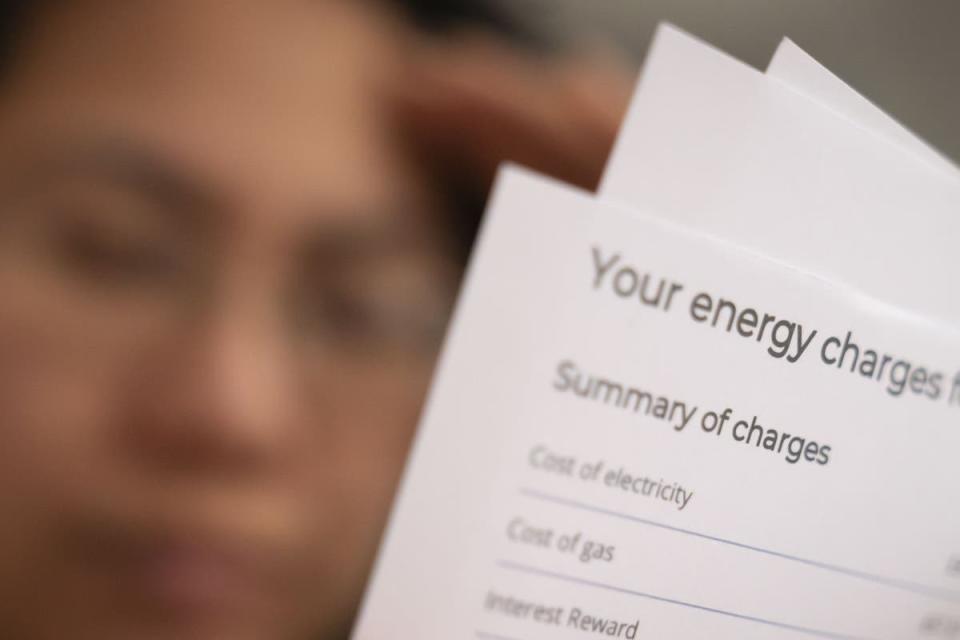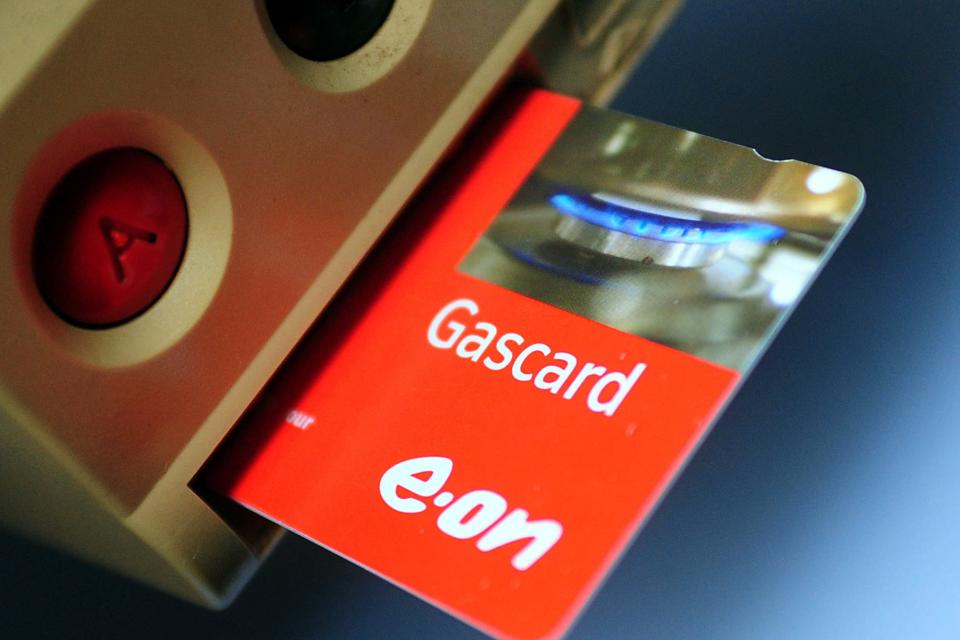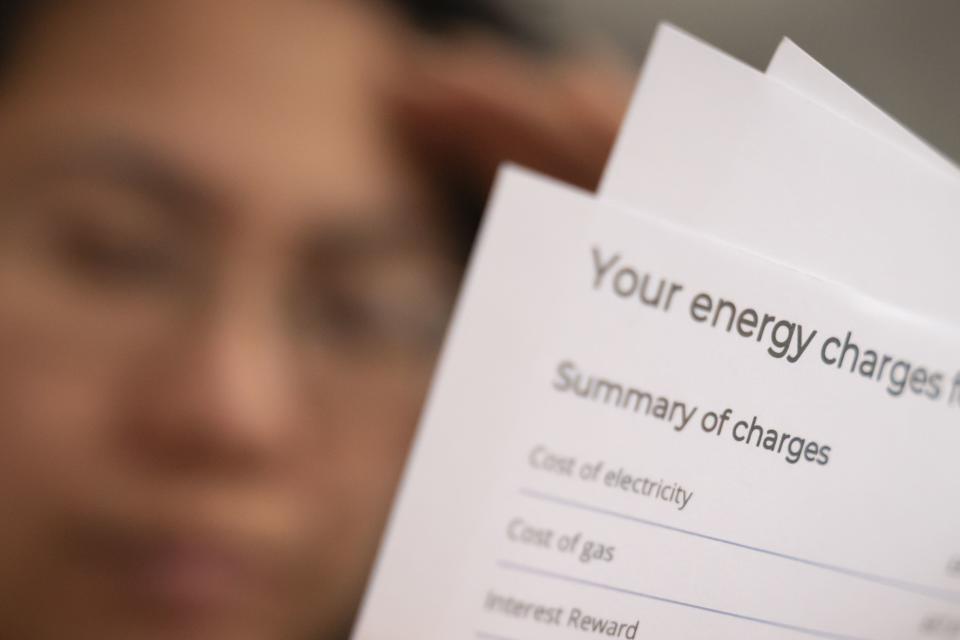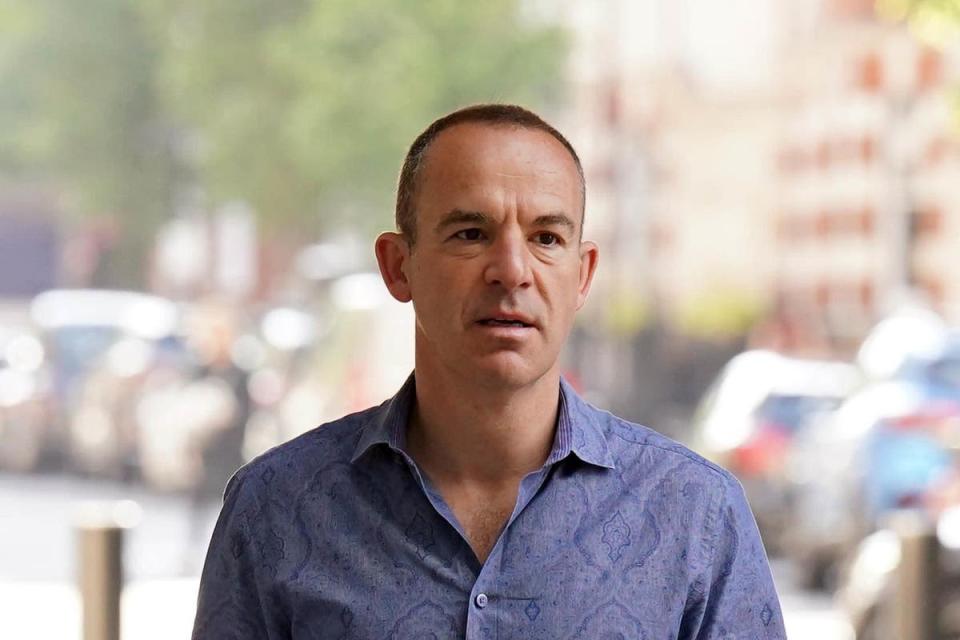Ofgem price cap news: Energy bills to fall as Martin Lewis reveals cheapest tariffs
Martin Lewis has revealed the most cost-effective tariffs after Ofgem unveiled an energy price cap.
Households are set to pay £238 less a year in energy bills from April after Ofgem unveiled its energy price cap.
The best tariff deals, according to the money-saving expert, are E.on Next’s ‘Next pledge’ which remains 3% less than the cap and British Gas’s price promise which could be up to 12% less than the cap.
The money-saving expert says traditionally pre-payment was a rip-off however now they will be around 3% cheaper to equalise charges with direct debit payments.
He said on X: “Prepay, which many of the most vulnerable use, was always the rip off, so this is a staggering turnaround.
“And this is unlikely to be a flash in the pan - this pricing structure is likely to continue for the foreseeable future.”
He warned users on cap plans before moving to prepay deals as providers usually offer more competitive deals to direct debit customers.
The new price cap is set to fall by 12.3% from the current £1,928 to £1,690 from April 1 for a typical dual fuel household in England, Scotland and Wales.
Key points
New price cap announced
Ofgem chief explains price cap drop
‘Many people will struggle to pay off debts'
22:51 , Sam Rkaina
We’re closing our live coverage of the Ofgem announcement but keep checking independent.co.uk for the latest updates.
Energy bills: How are Labour and the Conservatives proposing to help households?
18:00 , Lydia Patrick
Household energy bills are set to fall to their lowest point in two years, with Ofgem announcing this week it will lower its price cap by 12.3 per cent.
The regulator’s new price cap, which will come into effect in April, will see the average household gas and electricity bill fall from the current £1,928 in England, Scotland and Wales to £1,690 – a drop of around £20 a month, or £238 a year.
Ofgem said the drop would see energy prices reach their lowest level since Russia’s invasion of Ukraine in February 2022, which caused a spike in an already turbulent wholesale energy market, driving up costs for suppliers and customers.
Read the full story here...

Energy bills: How are Labour and Conservatives proposing to help households?
Comment - Martin Lewis is right: the energy price cut is welcome – but not quite as good as it looks
17:00 , Lydia Patrick
Afew weeks ago, the BBC’s Newsnight programme conducted a focus group of disillusioned voters, who were mostly pretty negative about our leading politicians. Asked who, in an ideal world, they’d like to have as prime minister, quite a few volunteered the name “Martin Lewis”, the well-known Money Saving Expert and consumer champion.
Of course, Lewis has got no political ambitions (so far as we’re aware) and even for a man of his adamantine, not to say saintly, integrity, political office might force him into the kinds of messy compromises ministers have to make. Far better to have him as the watchdog-in-chief, the man who regulates the regulators, such as Ofgem, who’ve decided to reduce the energy price.
Read the full piece here...

Martin Lewis is right: the energy price cut is welcome – but not as good as it looks
What does Ofgem’s price cap mean for my energy bills?
15:52 , Lydia Patrick
The typical household energy bill will fall to its lowest level for two years from April but will still remain well above pre-pandemic levels.
What can households expect over the coming months, and are years of exorbitant energy bills finally coming to an end?
Read the full story here...

What does Ofgem’s price cap mean for my energy bills?
Octopus energy comment on Ofgem’s price cap
14:35 , Sian Elvin
Rachel Fletcher, Director of Economics and Regulation at Octopus Energy, comments:
“It’s good to see Ofgem extend the ban on teaser tariffs, but it needs to end them once and for all. A permanent ban would force suppliers to compete by innovating and driving lower costs - rather than lazily relying on ‘tease and squeeze’ tactics, designed to lure customers in on temporary cut-price deals.
“A permanent ban on rip-off tariffs will prevent a return to the wild west energy market - which bamboozled customers and cost them billions in bailing out failed suppliers.”
Why is Ofgem’s price cap falling?
14:00 , Lydia Patrick
The fall reflects drops in wholesale energy prices – the amount energy firms pay for gas and electricity before supplying it to households.
The latest cap will see prices fall to their lowest level since Russia’s invasion of Ukraine in February 2022, which caused a further spike in an already turbulent wholesale energy market, driving up costs for suppliers and ultimately customers.
Market volatility led to the cap reaching a staggering £4,279 in January last year, although customers were partly shielded from this by the Government’s Energy Price Guarantee, which limited the average bill to £2,500.
Analysts Cornwall Insight said the lower cap suggested that the UK has, for now, weathered the storm of Red Sea tensions, securing a steady supply of LNG (liquefied natural gas) through the Atlantic.
Good availability of supply in Europe and Asia, in part due to mild weather, has also contributed to the drop in prices.
What does Ofgem’s price cap mean for my energy bills?
13:30 , Lydia Patrick
The typical household energy bill will fall to its lowest level for two years from April but will still remain well above pre-pandemic levels.
What can households expect over the coming months, and are years of exorbitant energy bills finally coming to an end?
Read the full story here...

What does Ofgem’s price cap mean for my energy bills?
PM weighs in on energy bills
13:21 , Lydia Patrick
Rishi Sunak has said the public are “feeling that the economy has turned the corner” and “things are getting better”.
Taking questions after a speech at the Welsh Conservative conference in Llandudno on Friday, the Prime Minister said: “There is a palpable sense out there, regardless of what Keir Starmer might want to say because he’s always keen to talk down Britain, I can tell actually on the ground people are, since the beginning of this year, feeling that the economy has turned the corner.
“They do see those green shoots. They can see that things are getting better.
“Inflation has been more than halved, mortgage rates starting to come down, wages have been rising for six, seven months in a row now.
“We just saw today … energy bills significantly down. Consumer confidence, business confidence, again, survey out yesterday, highest it’s been in years. Businesses like yours feeling better about the future.
“And that is why it is so important that we stick to our plan.”
Energy bills: How are Labour and Conservatives proposing to help households?
13:00 , Lydia Patrick
Household energy bills are set to fall to their lowest point in two years, with Ofgem announcing it will lower its price cap by 12.3 per cent.
The regulator’s new price cap, which will come into effect in April, will see the average household gas and electricity bill fall from the current £1,928 in England, Scotland and Wales to £1,690 – a drop of around £20 a month, or £238 a year.
Ofgem said the drop would see energy prices reach their lowest level since Russia’s invasion of Ukraine in February 2022, which caused a spike in an already turbulent wholesale energy market, driving up costs for suppliers and customers.
Read the full story here...

Energy bills: How are Labour and Conservatives proposing to help households?
Is the cap a maximum for energy bills?
12:30 , Lydia Patrick
The cap does not set the maximum a household will pay for their energy but limits the amount providers can charge them for each unit of power.
The amount you pay will depend on actual household usage as well as meter and payment type.
In addition, Ofgem will redefine its annual typical usage definition for future prices, to account for people that are using less energy.

9.6 million households are cold in the UK, charity claims
12:00 , Lydia Patrick
Responding to the news that the price at which the average annual energy bill will be capped has fallen from £1,928 to £1,690, Mike Childs, head of policy at Friends of the Earth, said:
“When energy prices have been so obscenely inflated for such a long time, this announcement might seem like a good thing. But new analysis out today finds there’s a staggering 9.6 million households living in cold, health-threatening, heat-leaking homes which they can’t properly afford to heat given they’re on low incomes, as well as the high cost of food and housing. It’s going to take more than a minor retreat in energy prices to resolve the country’s deeply entrenched cold homes problem.
“Cold homes are also a huge blow to the UK economy through costs to the NHS, days taken off work sick from illnesses associated with cold homes, and reduced educational attainment. There is an urgent need for a bold plan to upgrade the UK’s heat-leaking homes. This would save households hundreds of pounds each year on their bills and significantly reduce the societal costs of cold homes - estimated to be in the tens of billions of pounds annually by the Michael Marmot Institute of Health Equity. Neither of the main political parties have yet developed a plan that comes anywhere close to tackling the scourge of cold homes.”

Money saving expert reveals best tariff deals
11:53 , Lydia Patrick
E.on Next - Next pledge
- Stays 3% LESS than every Cap (so moves with Price Cap)
- £50 dual-fuel exit fees
Money saving expert said E.on Next would be worth considering as it’s a variable tariff offering a fixed discount off the Price Cap for one year.
It stays £50 below the price cap.
British Gas Price Promise to new and existing customers
- 12% LESS (but guaranteed to be below the April Price Cap)
- £150 dual-fuel exit fees
The money-saving expert explained it’s a complicated tariff but could be worthwile as it is guaranteed to be at least £1 per fuel under April’s Price Cap.
Deals deemed ‘borderline’
Outfox the Market’s next pledge deal for new and existing customers
Octopus Energy loyal Octopus 12M Fixed Feb 2024 v1- for existing customers
Ovo Energy’s 1 Year Fixed & Boiler Cover- for new and existing customers with £150 dual-fee exit.
Is it worth switching from the Price Cap to a fixed deal?
11:30 , Lydia Patrick
Money Saving Expert are advising households to consider a fixed deal if it is priced 17% less than the current January Price cap.
E.On Next’s Pledge tarriff promises to remain 3% lower than the price cap - so when the cap drops in April, so will the tariff, making it a worthwile option.
If consumers value certaintly over their monthly outgoings, British Gas Price Promise is around 12% cheaper than the current January cap and will drop to £1,688 a year for a typical dual-fuel user and remains fixed until June 2025.
Outfox the Market has a 12-month fix that’s 14% below the current Price Cap, and allows you to switch if a better deal comes along without paying an exit fee.
Octopus customers might wish to consider the Octopus Tracker tariff which rates change day-to-day according to wholesale costs, making it cheaper than the Price Cap in recent months.
Why is the energy price cap going down?
11:00 , Lydia Patrick
The energy price cap is calculated based on wholesale energy prices. This is the amount energy providers pay for gas and electricity before supplying it to households – and it has begun to fall steadily in recent months.
Energy consultancy firm Cornwall Insight has gained a reputation in recent years for near-accurate predictions of coming energy price cap changes. They consider a range of factors, including wholesale energy prices and Ofgem’s own approach, to make their forecasts.
While the lowering of the energy price cap will come as welcome news to those struggling with their bills, it is still nearly £500 higher than when the cap was introduced in January 2019.
How does the price cap work?
10:30 , Lydia Patrick
The energy price cap is the maximum amount energy suppliers can charge for each unit of energy for households on a standard variable tariff.
It is not the maximum amount you could be charged for energy in a year, nor a fixed rate. Rather, it is an indication of the average amount households can expected to pay if their energy consumption is ‘typical’.
In practice, the price cap corresponds to the maximum limit on what providers can charge per unit, either per kWh or as a daily standing charge. What you will actually pay will depend on where you live, how you pay your bill, and the type of meter you have.
The price cap was introduced by the government in 2019 to ensure energy bills accurately reflect the cost of energy. It is updated every three months.
The price cap sets a maximum daily standing charge - what you pay to have your home connected to the grid.
It also limits what providers can charge for each unit of gas and electricity- the more you use, the more you pay.
Watch - Martin Lewis explains what Ofgem price cap slash really means for you
09:35 , Lydia Patrick
09:30 , Lydia Patrick
National disability charity Sense is warning that Ofgem’s recently announced energy price cap fall of an average of £238 will bring little relief to disabled households.
Richard Kramer, Chief Executive of the national disability charity Sense, said: “Rising costs have pushed over half of disabled households into debt; for these families, news that the energy price cap has fallen will bring little relief without more robust measures. Energy costs remain significantly higher than they were before the pandemic, yet disabled people are still waiting for long-term financial support.
“Despite the extra energy costs that disabled people face, this year the government shelved its plans to look into implementing a social energy tariff. Sense is urging the government to think again and ensure households who need energy for essential equipment like powered wheelchairs are put on an equal playing field.”
ICYMI - Martin Lewis reveals ways for UK customers to beat Ofgem price cap
08:30 , Lydia Patrick
Martin Lewis has shared his top tip to beat the incoming energy price cap and save hundreds of pounds on gas and electric bills.
The Money Saving Expert founder explained how energy prices are predicted to drop by around 17 per cent this year and shared one fix that could get a person’s costs down even further.
It comes after regulator Ofgem introduced an energy price cap hike in the new year which saw the cap rise from £1,834 - the lowest figure since March 2022 - to £1,928 a year on 1 January.
The price cap is set four times a year, with the next adjustment set for 1 April.
Although some experts believe the cap will fall at the next review, Mr Lewis shared his “no brainer” trick to beat the price cap by three per cent in the meantime.
Read the full story here...

Martin Lewis reveals ways for UK customers to beat Ofgem price cap
Martin Lewis reveals five things you need to know as Ofgem announces new energy price cap
08:09 , Lydia Patrick
Money expert Martin Lewis has revealed his five top tips for the cheapest energy tariffs after Ofgem announced the price cap drop on Friday.
Household energy bills have fallen to their lowest in two years, with the average duel-fuel household seeing a fall of £238 for the average dual-fuel household or around £20 a month over the course of a year.
Responding to the announcement, Mr Lewis unveiled five key points of information including tips on which is the cheapest way to pay, switching deals and how to undercut the price cap.
“The new rates for 1 April have just been announced. In a nutshell, for every £100 a Direct Debit user spends on energy today, they’ll pay £87.70 for it from 1 April,” he posted on X.
Read the full story here...

Martin Lewis reveals five things you need to know as Ofgem announces new price cap
‘Millions living in cold damp homes’
07:58 , Katy Clifton
Even after the energy price cap drop, bills still remain 60 per cent higher than they were before the energy bills crisis began, the End Fuel Poverty Coalition warned.
Simon Francis, co-ordinator of the organisation, added: “Three years of staggering energy bills have placed an unbearable strain on household finances up and down the country.
“Household energy debt is at record levels, millions of people are living in cold damp homes and children are suffering in mouldy conditions.
“Everybody can see what is happening in Britain’s broken energy system and it is time for politicians to unite to enact the measures needed to end fuel poverty. This includes cross-party consensus on a long-term plan to help all households upgrade their homes and short-term financial support for households most in need.”
‘Many people will struggle to pay off debts'
07:56 , Katy Clifton
The head of Citizens Advice welcomed Ofgem’s announcement this morning, but warned that “the impact of sky-high prices will be felt for years to come”.
Dame Clare Moriarty added: “It’s good news that the cost of energy is falling, but the impact of sky-high prices will be felt for years to come.
“We know more than five million people live in households behind on their energy bills and, with the price of energy still far higher than just three years ago, many people will struggle to pay off these debts.
“The government promised a new plan for energy bill support by April 2024, but will miss its own deadline. And the withdrawal of cost-of-living payments this spring will make it so much harder for many of those already finding it difficult to make ends meet. Without action, people will face a cycle of winter crises year after year.”
Ofgem energy price cap: Everything you need to know
07:49 , Lydia Patrick
Ofgem has announced the latest price cap today as households prepare to see their energy bills fall to their lowest level in more than two years.
The fall will be £1,690 from April 2024 - a fall of £238 for the average dual-fuel household.
The change will come into effect in April, lasting three months until the end of June.
Read the full story here...

Ofgem energy price cap: Everything you need to know
Ofgem unveils price cap fall as households to pay less in energy bills
07:37 , Lydia Patrick
Households will see their energy bills fall to their lowest level in more than two years as regulator Ofgem announced a reduction in its price cap.
The fall, which comes amid the cost-of-living crisis, will be £1,690 from April 2024 - a fall of £238 for the average dual-fuel household.
The 12 per cent average fall is due to come into effect on 1 April and will last three months until the end of June.
Read the full story here...

Ofgem unveils price cap fall as households to pay less in energy bills
Ofgem chief explains price cap drop
07:24 , Katy Clifton
Ofgem chief executive Jonathan Brearley said: “This is good news to see the price cap drop to its lowest level in more than two years – and to see energy bills for the average household drop by £690 since the peak of the crisis – but there are still big issues that we must tackle head-on to ensure we build a system that’s more resilient for the long term and fairer to customers.
“That’s why we are levelising standing charges to end the inequity of people with prepayment meters, many of whom are vulnerable and struggling, being charged more up-front for their energy than other customers.
“We also need to address the risk posed by stubbornly high levels of debt in the system, so we must introduce a temporary payment to help prevent an unsustainable situation leading to higher bills in the future. We’ll be stepping back to look at issues surrounding debt and affordability across market for struggling consumers, which we’ll be announcing soon.
“These steps highlight the limitations of the current system – we can only move costs around – so we welcome news that the Government is opening the conversation on the future of price regulation, seeking views on how standard energy deals can be made more flexible so customers pay less if using electricity when prices are lower.
“But longer term we need to think about what more can be done for those who simply cannot afford to pay their energy bills even as prices fall. As we return to something closer to normality we have an opportunity to reset and reframe the energy market to make sure it’s ready to protect customers if prices rise again.”
New price cap announced
07:22 , Katy Clifton
Good morning and welcome to our live updates on Ofgem’s energy price cap announcement.
The average household energy bill is to fall to its lowest point in two years from April after Ofgem lowered its price cap in response to wholesale prices.
The regulator announced it is dropping its price cap by 12.3% from the current £1,928 for a typical dual fuel household in England, Scotland and Wales to £1,690, a drop of £238 over the course of a year or around £20 a month.
Ofgem said the drop would see energy prices reach their lowest level since Russia’s invasion of Ukraine in February 2022, which caused a spike in an already turbulent wholesale energy market, driving up costs for suppliers and customers.


